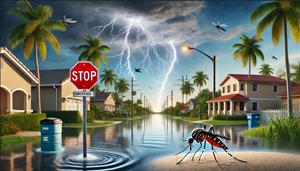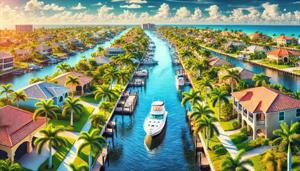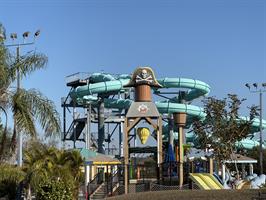Cape Coral, Florida, is known for its scenic canals, sunny weather, and laid-back lifestyle, but like any city, it has its downsides.
Sometimes referred to as "Cape Coma," or Crap Coral," for the lack of things to do, there is no shortage of critics on the city.
From weather challenges to limited amenities, here are some of the less appealing aspects of life in Cape Coral.
1. Hurricane and Flooding Risks
Cape Coral’s proximity to the Gulf of America makes it susceptible to hurricanes and tropical storms, particularly during hurricane season.
Flooding is a major concern in areas closer to the coast and low-lying neighborhoods, which often require flood insurance.
Preparing for storms and potential evacuations can be stressful and costly.
2. Traffic and Four-Way Stops
Traffic congestion is a common complaint in Cape Coral, especially during tourist season.
The city’s reliance on four-way stops at many intersections adds to the frustration, as it can slow down commutes significantly.
The bridges connecting Cape Coral to Fort Myers also experience heavy traffic, particularly during rush hours.
3. Limited Beaches
Despite its waterfront location, Cape Coral has only one true beach: the Cape Coral Yacht Club Beach.
While it’s a charming spot, the water is murky and comes from a river rather than the Gulf.
For pristine, sandy beaches, residents and visitors often need to travel to nearby Fort Myers or Sanibel Island.
4. Summer Heat and Humidity
The heat in Cape Coral can be overwhelming from May to October, with temperatures frequently reaching the 90s and high humidity levels making it feel even hotter.
This can limit outdoor activities and make air conditioning a necessity, increasing energy costs during the summer months.
5. Lightning Storms
Florida is known as the lightning capital of the U.S., and Cape Coral is no exception.
Summer months bring frequent afternoon thunderstorms with intense lightning, which can disrupt plans and pose safety risks.
Power outages during storms are also not uncommon. It's best to have some kind of surge protection on your electronic devices.
6. Bugs and Pests
The warm and humid climate in Cape Coral attracts a variety of pests, including mosquitoes, ants, and palmetto bugs (commonly referred to as roaches).
These bugs can be a nuisance, especially during the summer, requiring regular pest control measures to keep them at bay.
7. Lack of Parks and Green Spaces
While Cape Coral offers some parks, many residents feel there aren’t enough natural or green spaces for a city of its size.
The existing parks are often small, and the city lacks larger natural preserves or extensive trails, limiting options for outdoor enthusiasts seeking more expansive natural areas.
8. Driving Everywhere and Lack of Public Transit
Cape Coral is a car-dependent city, with minimal options for public transportation.
Residents need to drive nearly everywhere, whether it’s for groceries, work, or leisure activities. This can be inconvenient for those who don’t own a car or prefer using public transit.
The lack of comprehensive transit options also increases traffic congestion and limits accessibility for visitors.
9. Boating Regulations and Accessibility
Although Cape Coral is a boating paradise, the city’s extensive canal system comes with rules and regulations that can be restrictive.
Speed limits and environmental considerations may impact boating activities, and some canals can become crowded, particularly during peak seasons.
10. Snowbirds
For many people, Cape Coral is not a year-round home. You will find many people here from northern states like New York that come here only for the winter.
While these people do drive local commerce when they are here, they are not as committed to the city and cause increased traffic.
Conclusion
Cape Coral, Florida, offers many benefits, but it also has its challenges.
From hurricane risks to limited parks and natural spaces, it’s important to consider these drawbacks when deciding to move to or visit the area.
Understanding the cons can help set realistic expectations and ensure Cape Coral is the right fit for your lifestyle.



